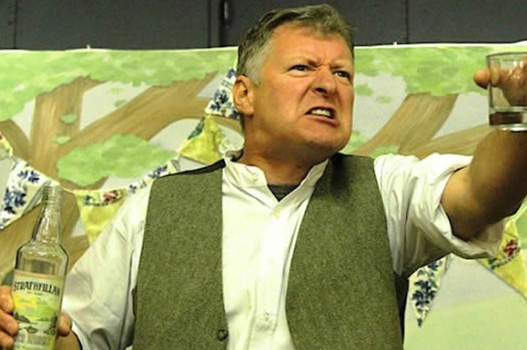
Acting, as we all know, is a precarious profession. Every time an actor walks on stage he is baring himself and leaving himself exposed. In a typical play he has the comfort and support of the rest of the company and a text that, to a certain extent, has been tried and tested. When an actor chooses to perform a one-man show and, what is more, one he has conceived, written and directed himself, there is no safety net.
There is a lot of Shakespeare around at the moment and Mark Carey’s play Into the Breach finds a nice new angle to explore. It is the story of George Crocker, stalwart of the Lowford amateur dramatic society in Devon. He is looking forward to giving his Widow Twanky only to learn that, instead of the panto, they will be performing Henry V.
The play is set in 1943 (Into The Breach that is, not Henry V) and with a war raging it is left to a motley crew of middle-aged or unfit men and a few women to mount the play. Shakespeare was a much rarer beast in the days before Hollywood and star-studded television productions brought the bard into our front rooms. For those of us of a certain age, Shakespeare was inflicted upon us in school rather than taught and it took a long time to be cured of the aversion.
This is the problem that George has, he has no connection, no starting point; it is just words that he doesn’t understand. Originally cast as Chorus, (“how can I play a character that doesn’t even have a name,” he moans), he has greatness forced upon him when the director and leading man, in-house luvvie ex-RADA, or so he says, Simon Trottley Barnes, can’t remember his lines as the king and switches roles.
George is still unable to connect and it is left to the local village idiot, the savant fool, Ticker, to enlighten him. George has been through the First World War, so being a soldier, Ticker points out, is something he and Henry have in common. This lets in the light for George and he realises that Shakespeare’s work is an encyclopaedia of life itself, revealing all human emotions and situations. He is able to relate to the king, especially when he connects two deaths that profoundly affected them both. In the case of Henry it was the death of the Boy in Act 4 and for George it was the demise of a young lad with whom he fought alongside in the trenches – a lad who survived the war only to be killed soon after by a lorry on the streets of Bristol. In the second half of Into the Breach the characters of George and the King Henry become intertwined and almost inseparable.
Into the Breach is a tour-de-force by Mark Carey for its concept, writing and his performance. He skips effortlessly between the half-dozen, eccentric characters without pausing for breath and was a joy to watch. However, I think the play’s greatest achievement was to demonstrate that, even after 400 years, Shakespeare is accessible and relevant to us all, at all times and in all circumstances. ★★★★☆ Michael Hasted 8th May 2016

